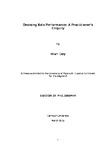Devising Solo Performance: A Practitioner’s Enquiry
| dc.contributor.supervisor | Hall, John | |
| dc.contributor.author | Dey, Misri | |
| dc.contributor.other | Faculty of Arts, Humanities and Business | en_US |
| dc.date.accessioned | 2015-04-07T14:48:53Z | |
| dc.date.available | 2015-04-07T14:48:53Z | |
| dc.date.issued | 2015 | |
| dc.identifier | 949144 | en_US |
| dc.identifier.uri | http://hdl.handle.net/10026.1/3289 | |
| dc.description.abstract |
This research explores the validity and value of ‘solo devising’ as a means for specifying a category of theatre-making that has been little discussed, compared to group devising, in existing literature on devising and postdramatic theatre. Primary source material was obtained through carrying out extended interviews with five experienced British theatre practitioners who have made work that could be described as solo devised performance: Tim Etchells, Bobby Baker, Mike Pearson, Nigel Charnock and Wendy Houstoun. In analysing these interviews, referred to in detail but not reproduced in full, the enquiry draws on a range of writings, including Oddey, Heddon, Harvie, Alexander and George, on devising and making performance and in particular on Melrose’s concept of practitioner-centred expert knowledge, Lehmann’s notion of the postdramatic and Sennett’s specification of expertise in craftsmanship. Chapter One considers solo practice in relation to the idea of a solo devising economy, the interviewees’ professional work and other experimental solo practices within theatre, performance, dance and art. Chapter Two explores how the interviewees create multiple performance personae, doing and undoing notions of individuality and autobiography through strategies of working ‘about’, ‘from’ and ‘beyond’ the self. Chapter Three explores solo devising processes, involving research, generation of material, composition, performance and ‘orchestration’. Chapter Four scrutinises different kinds of collaboration, including ‘audiencing’, as both enabling and productively confounding activities occurring within solo devising. Chapter five specifies some findings about solo devising: that it both involves expert, crafted, individual working, requiring orchestration of a high number of activities and skills, and, simultaneously, practices of negotiated authorship with other artists and audiences, enabling a potentially political reading of its distinctly ambiguous working. An additional finding is that close attention to what expert practitioners say about their work can yield rich information about a specific practice. | en_US |
| dc.description.sponsorship | Dartington College of Arts | en_US |
| dc.language.iso | en | en_US |
| dc.publisher | Plymouth University | en_US |
| dc.subject | Solo devising | en_US |
| dc.subject | Solo performance making | |
| dc.subject | Devising | |
| dc.subject | Theatre | |
| dc.subject | Solo postdramatic theatre | |
| dc.subject | Expert solo performance making | |
| dc.subject | Solo and collaborative theatre making | |
| dc.subject | Practitioner-centred discourses on solo making | |
| dc.subject | Solo devising economies | |
| dc.title | Devising Solo Performance: A Practitioner’s Enquiry | en_US |
| dc.type | Thesis | |
| plymouth.version | Full version | en_US |
| dc.identifier.doi | http://dx.doi.org/10.24382/4724 |
Files in this item
This item appears in the following Collection(s)
-
01 Research Theses Main Collection
Research Theses Main


